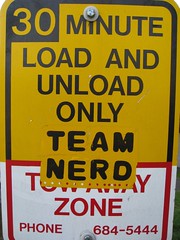
The second thing I wanted to write about was sparked by the panel Not Like Other Girls. There was a general discussion about what this phrase implied and how divisive it can be. Geek culture tends to be defined by boys and men, and they are the gatekeepers and identity policers. I’ve heard other discussions about this phrase, so the panel wasn’t the first time I’d come across this concept. If you want to get some perspective from the inside, I highly recommend reading David J. Schwartz’s essay, Masculinity Is an Anxiety Disorder: Breaking Down the Nerd Box.
Not like other … is used as a tool to create more isolation and separation. The panelists spoke about how special it made them feel, to be identified this way, at first. They also started to look down on the girls who weren’t like them. They then believed that because they weren’t like the other girls, that those same girls wouldn’t like them and vice-versa. So they withdrew or withheld and stayed with those who approved of them. They spoke of a desire to maintain approval, which included not appearing too emotional or “high-maintenance.”
There are wide-reaching implications for this phrase. It’s not just limited to romantic relationships, or social interactions. This plays out in the workplace, too.
The panelists talked about how this affected their relationships with women in the workplace. One panelist told a story that I am sure was incredibly painful for her. She was the only woman on her team, and in a lead role. A second woman joined her team, and the panelist didn’t reach out to her or welcome her. She was afraid of losing her position within the group, and felt threatened, rather than seeing her as an equal. This ended up creating more conflict and affected cohesion and trust within the group.
Because we are not immune to the messages we receive from society, we internalize the messages and judgment of the mainstream, even when it contradicts our own internal knowing. One of the panelists talked about how we have a first thought when we meet someone. These are the judgments we’ve learned from society. But hopefully we then notice this thought and reflect on it, leading to a second thought, which is what we think. Second thoughts are generally considered bad, but in this case, HAVE SECOND THOUGHTS!
I also wanted to talk about you’re not like other … in general. I don’t know if you’ve ever had someone say this to you in a different context, but I have for pretty much every demographic I can fit into: American, women, Jews, queers, femmes … Probably twins, writers, brown-haired people, tea drinkers, etc. This has had the effect of making me feel weird. It sends me the message that I don’t fit in or belong. It never felt like I was receiving the “cool” badge.
We all have ideas of what defines a particular group of people. I know I do, too. The next time you meet someone and you think, “Gee, that person isn’t like other [people],” consider flipping it around. Try seeing them as a way of expanding your definition of what qualities or attributes define that group, as in, “Oh, [people] can be like that, too. Coooool.”
Next week I’ll do my final write-up, which is going to be the panel discussion with Anita Sarkeesian and Zoe Quinn. So stay tuned!

